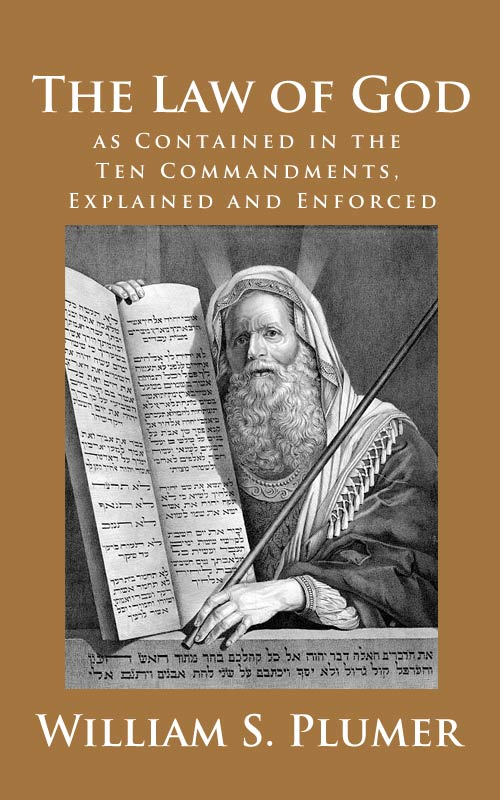 by William S. Plumer
by William S. Plumer
in ePub, .mobi & .pdf formats
"Do not think that I have come to abolish the Law or the Prophets; I have not come to abolish them but to fulfill them. I tell you the truth, until heaven and earth disappear, not the smallest letter, not the least stroke of a pen, will by any means disappear from the Law until everything is accomplished." Jesus Christ.
"To obey is better than sacrifice, and to hearken, than the fat of rams. Samuel. The law of your mouth is better unto me than thousands of gold and silver... A good understanding have all those who do his commandments." David.
"The commandment is a lamp and the law is light." Solomon.
"He will magnify the law and make it honorable.... The Lord is our judge, the Lord is our lawgiver, the Lord is our king." Isaiah.
"The the law is holy, and the commandment is holy, righteous and good... Do we, then, nullify the law by this faith? Not at all! Rather, we uphold the law." Paul.
"If you judge the law, you are not a doer of the law but a judge.... There is one lawgiver who is able to save and to destroy." James.
"Whoever commits sin, transgresses also the law." John.
"If we have not the spirit of grace, the law comes only to convict and slay us." Augustine.
"If even for one day I fail to compare my heart with the law of God, I am sensible of a decline in my devotional feelings.... If I give unto the law its proper definition, and keep it within the compass of its office and use, it is an excellent thing; but if I translate it to another use and attribute that unto it which I should not, then do I not only pervert the law, but also the whole Scripture." Luther.
"The law is like a mirror, in which we behold, first, our impotence; secondly, our iniquity, which proceeds from it; and lastly, the consequence of both, our obnoxiousness to the curse." Calvin.
"There was never so much matter and marrow, with so much admirably holy cunning, compended, couched and conveyed in so few words, by the most terse, concise, sententious and singularly significant spokesman in the world—as we find in the moral law. Durham. The dignity of the name of divine laws is reserved to those which concern the duties of religion, such as the two fundamental laws [love to God and love to man] the Decalogue, and all the precepts contained in the Holy Scriptures about faith and practice." Domat.
"Two things there are, which, the oftener and the more steadfastly we consider, fill the mind with an ever new, an ever rising admiration and reverence: the STARRY HEAVENS above, and the MORAL LAW within." Kant.
"Ignorance of the nature and design of the law is at the bottom of most religious mistakes." John Newton.
"None but rogues and felons look at a law to find out how they may evade it." Hare.
"Of the law there can be no less acknowledged than that her seat is the bosom of God, her voice the harmony of the world. All things in heaven and earth do her homage, the very least as feeling her care, the greatest as not exempted from her power. Both angels, and men, and creatures of whatever condition, though each in different sort and measure, yet all with uniform consent, admitting her as the mother of their peace and joy." Hooker.
"I am confident of it, and affirm boldly there is not one man made free by Christ, that makes it his rule to be bold to commit sin because of the redemption that is in the blood of Christ; but that Christ who has redeemed from sin and wrath, has also redeemed from a vain life. All who have the pardon purchased by Christ for them, have also the power of God in them, which keeps them, so that they do not sin licentiously." Crisp.
"Though the moral law is not a Christ to justify us, yet it is a rule to instruct us.... The law of God is a hedge to keep us within the bounds of sobriety and piety." Thomas Watson.
"Those only, who obey the word of the Lord's direction, shall enjoy the consolations of his love." Mason.
"If a man has not spiritual and just apprehensions of the holy law, he cannot have spiritual and transforming discoveries of the glorious gospel." Colquhoun.
"The purity of the law appears from its forbidding sin in all its modifications, in its most refined as well as in its grossest forms; the taint of the mind as well as the pollution of the body; the secret approbation of sin, as well as the external act; the transient look of desire, the almost unperceived irregular motion." Dick.
"The divine Lawgiver sees and knows the relations of things perfectly. He can draw no wrong deductions from them. He can make no mistake. Whatever laws have certainly emanated from him are certainly right." Sharswood.
-----
Table of Contents
1. Great Truths
2. The Law Defined
3. The Moral Law as Given in Exodus and in Deuteronomy
4. The Giving of the Law
5. The General Character of the Law
6. Correct Rules of Interpreting the Law
7. The Uses of the Law
8. The Nature of the Obedience Required by the Law
9. The Place Good Works Occupy in a System of Grace
10. Salvation Is Not by Our Obedience to the Law
11. Antlnomianism
12. The Gospel Does Not Supersede the Moral Law
13. Detached Remarks
The First Commandment
The Second Commandment
The Third Commandment
The Fourth Commandement
The Second Table of the Law
The Fifth Commandment
The Sixth Commandment
The Seventh Commandment
The Eighth Commandment
The Ninth Commandment
The Tenth Commandment
How may we know our sins?
Christian Liberty
Rules for Conscience
